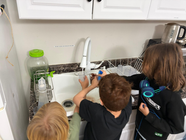
MIAMI SUDBURY SCHOOL
A Truly Unique and Powerful School Experience
K-12 Self-Directed Democratic School
No homework or testing
Students are not divided into grade levels and don't have to follow any kind of predetermined curriculum.
Learning by living & play
In a mixed-age community, learning happens in a natural, not forced way by self-chosen activity.
Success without stress
Students learn sooner than their peers what really matters in college, business, and life.
The Miami Sudbury School is a K-12 democracy where young people have human and civil rights.

We give the time and space for young people to learn who they are, what they like, and how to achieve their goals while working authentically within a mixed-age community based on respect, responsibility, and self-direction.

We are an absolutely unique place where ages 4-18 are encouraged to play and literally help run the show, where the driving force is personal growth instead of forced academics.

The Sudbury Advantage
Backed by Science
Sudbury represents a bold, research-backed educational philosophy—rooted in cognitive science, developmental psychology, and decades of successful practice across the globe. Miami Sudbury School is proud to be part of the Sudbury International Network, a vibrant professional community of educators and innovators spanning more than 20 countries.
At The Miami Sudbury Schooll your child will benefit from the following unique advantages:
PARENT TESTIMONIALS




WHAT A SCHOOL DAY LOOKS LIKE
At almost any time of day, you can walk into the room and find a free-flowing conversation, game, or project going on that anyone is welcome to join and that can cover almost any topic. Activities can change quickly throughout the day or students can get so involved that the activity can extend into the next day. There are often meetings called by students to plan activities or to put together a budget request proposal. Learning through play while managing time, social interactions, meetings, and a direct democracy they have a valuable vote in are rare and precious features of a Sudbury school. Since students can decide how to spend their time (constantly building their executive functioning muscles), it’s hard to generalize about what they do. Here are some common activities that might be observed: talking, reading, making art, playing games, playing sports, dancing, discussing, planning... and all the while learning. When young people are allowed to follow their interests, they often surprise us all in what they become interested in. They may not even realize that by making choices of what to do all throughout their school day, their “typical day” is a robust preparation for the rest of their lives as confident, independent human beings capable of doing just about anything.
Message From Our Founder
Our world today can automate many things - computers can be the obedient worker bees children were once trained to become.
We need other things - self-driven, creative, curious, interconnected people who don’t wait to be told what to do and when to do it.
Sudbury Schools help young people practice these very skills in a safe and supportive mixed-age environment that models the real world, where their voices and choices really matter.
PLUS, and this is not simply a bonus but a key element that adults discount at their own peril, Sudbury youth get to enjoy the childhood and adolescence that only comes around once - this is part of that magic of success that Sudbury schools see daily.
Christen Parker-Yarnal
Miami Sudbury School founder

Christen Parker-Yarnal spoke at Miami's PechaKucha Night January 2022 on "Reimagining Education".
MEET THE STAFF
All of our Staff Members are experienced educators who have strong foundations in Sudbury model philosophy, child development, and youth empowerment
"I didn’t have a Sudbury education, but as an adult, I do what they’re doing here. As an adult, I’ve gone into two lucrative professions by teaching myself. I taught myself how to read and ended up becoming a head designer at a company that did touch screens for schools. I ended up going to Miami Dade schools and directing people with doctorates but I’m all self-taught. I’m now setting up a laboratory to do micropropogation for clean rooms for tissue culture of plants. All self-directed. At some point you realize you know what you want and then you find out the requirements.”
Dad of Miami Sudbury Student
"All the negativity at [public] school where they are all day and then at home with tutors and iReady... He was lacking things and was taking the rejections personally. He now comes home wanting to learn.”
Parent of an 8 year old Miami Sudbury Student
"He has a sense of belonging there. I can sense he feels safe. Thank you!”
Parent of 7 year old
I have enjoyed watching her grow, claim her voice, explore her interests, and make vital and substantive connections with other students and [staff].”
Parent of teenage student







































